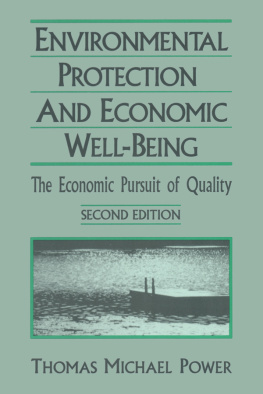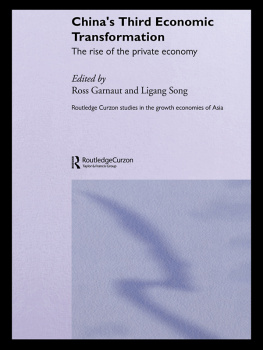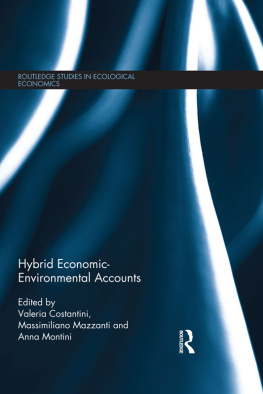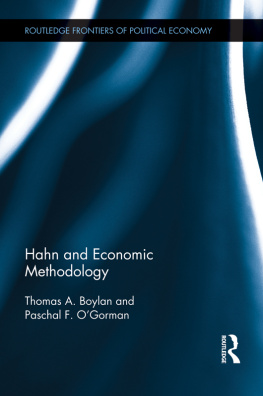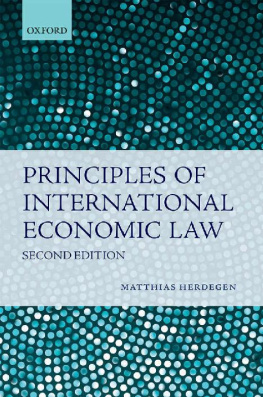ENVIRONMENTAL
PROTECTION
AND ECONOMIC
WELL-BEING
ENVIRONMENTAL
PROTECTION
AND ECONOMIC
WELL-BEING
The Economic Pursuit of Quality
SECOND EDITION
THOMAS MICHAEL POWER
First published 1996 by M.E. Sharpe
Published 2015 by Routledge
2 Park Square, Milton Park, Abingdon, Oxon OX14 4RN
711 Third Avenue, New York, NY 10017, USA
Routledge is an imprint of the Taylor & Francis Group, an informa business
Copyright 1996 Taylor & Francis. All rights reserved
No part of this book may be reprinted or reproduced or utilised in any form or by any electronic, mechanical, or other means, now known or hereafter invented, including photocopying and recording, or in any information storage or retrieval system, without permission in writing from the publishers.
Notices
No responsibility is assumed by the publisher for any injury and/or damage to persons or property as a matter of products liability, negligence or otherwise, or from any use of operation of any methods, products, instructions or ideas contained in the material herein.
Practitioners and researchers must always rely on their own experience and knowledge in evaluating and using any information, methods, compounds, or experiments described herein. In using such information or methods they should be mindful of their own safety and the safety of others, including parties for whom they have a professional responsibility.
Product or corporate names may be trademarks or registered trademarks, and are used only for identification and explanation without intent to infringe.
Library of Congress Cataloging-in-Publication Data
Power, Thomas M
Environmental protection and economic well-being: the economic pursuit of quality /
Thomas Michael Power.2nd ed.
p. cm.
Rev. ed. of: The economic pursuit of quality. c1988.
Includes bibliographical references and index.
ISBN 1-56324-734-8 (alk. paper).ISBN 1-56324-735-6 (pbk.: alk. paper)
1. Economics.
2. Economic developmentEnvironmental aspects.
3. Environmental protection.
I. Power, Thomas M. Economic pursuit of quality.
II. Title.
HB171.P697 1996
330dc20
96-3646
CIP
ISBN 13: 9781563247354 (pbk)
ISBN 13: 9781563247347 (hbk)
To the woman who has brought the quality into my life,
to my wife, Pamela Shore,
this book is gratefully dedicated.
Contents
This book is an extensively rewritten version of a book originally published by M.E. Sharpe in 1988 under the title The Economic Pursuit of Quality. The revisions and expansions have sought to bring the data used and the literature cited up to date and to correct any deviations between reality as it has actually unfolded and assumptions about the near future made in 1987 when the original book was being written. For better or worse, in the authors not always humble judgment, the basic analysis and arguments of the book have not only stood the test of time but become even more important to an informed public economic dialogue.
The title of the book has been changed from that used in the 1988 version. The Economic Pursuit of Quality, which playfully contrasted two concepts most people do not usually associate with one another, was not very descriptive of the subject matter of the book. Some people, looking just at the title, thought that the book dealt with quality control or quality management. The focus on environmental quality was hidden. The new titleEnvironmental Protection and Economic Well-Being: The Economic Pursuit of Qualitykeeps the play on words in the subtitle but attempts to make clear that the focus of the book is the role of environmental quality in local economic development and the determination of local economic well-being.
As warned in the original preface, which is reprinted below, professional economists are likely to shake their heads at this book and insist that there is nothing new here. This book does not make any attempt to contribute to the economic literature that is developed in academic journals and monographs. Rather, it seeks to draw from that literature to critique a pervasive folk economics that tends to dominate discussions of local economic well-being. As the development of the wise-use and militia movements in the early 1990s dramatically demonstrates, a widely held and emotionally powerful set of economic arguments is regularly deployed in political discussions in our rural areas. Environmental regulation and efforts to protect natural landscapes are seen as destructive and illegitimate government interventions into peoples lives and a free-enterprise economy. With anger and the threat of violence, it is asserted that the government and environmentalists are purposely impoverishing our rural areas by effectively confiscating private property and inhibiting private economic activity.
This book seeks to answer such charges by looking closely at the role that environmental quality and protected natural landscapes play in the determination of local economic well-being. Many of the people most courted by wise-use and militia groups have demonstrated in their very decisions about how and where they live their lives that high-quality living environments are a primary source of well-being to them. This book seeks to make explicit those choices and the economic values that lie behind them.
The folk economics that dominates much of our local economic development dialogue is no longer just a quaint reminder of bygone days when life was simple and almost all of us worked the land for a living. Folk economics now threatens both the environment and civil peace. It is important to try to respond to folk economics in a reasoned voice that is grounded in current economic reality. That is what this book seeks to do.
This book attempts to change the popular understanding of what economics and the economy are all about. It seeks to undermine the popular association of economics with commercial activity, necessity, quantitative dollar flows, and the production and sale of goods. It seeks to document the fact that it is actually discretionary qualitiessubjective, disputable, aesthetic qualitiesthat both motivate economic activity and provide its primary inputs.
Changing this popular perception of economics is important because, increasingly, the determinants of our economic well-being are not produced by commercial businesses and automatically evaluated by the commercial market. Instead, they flow from diverse, noncommercial sources. If we are going to protect and improve our economic well-being, at the very least we need to know where we should focus our attention. Current popular economic perceptions mislead us.
This book is aimed at the informed noneconomist. Economic jargon and mathematical formulations have been avoided in favor of plain English, and professional economists will find little that is new or original except the emphasis. This might surprise noneconomists, but the fact of the matter is that there are two quite different types of economics in use in policy discussions. There is professional, academically based economic analysis. And then there is a popular folk economics. Only a very small part of the population has much regular experience with professional economic analysis. Economists keep it that way by speaking in a private language and hiding behind nearly incomprehensible mathematical models. The folk economics, on the other hand, is closely tied to the world of business and to peoples experiences in the commercial world, and is regularly reinforced by the business community, local political and civic leaders, and the mass media.
Next page
